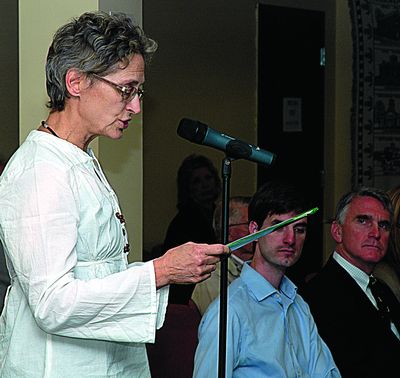Subscriptions
Menu
Advertisements
Supervisors could move to ban pipelines
8/19/2014 |
By Jim Poole |

Some but not all Schoharie County supervisors favor a ban of gas pipelines across the county.
Aware of heightened interest in the county from pipeline companies, supervisors debated a ban at their monthly meeting Friday but failed to take action.
They may do so at their September meeting.
Constitution Pipeline and Tennessee Gas Pipeline seek to build pipelines through the county, and some supervisors believe other pipeline companies are interested, too.
Opponents are concerned not only about pipeline safety issues, but also how lines may affect property values and that they may promote hydrofracking. Others believe pipelines could be profitable for landowners.
Blenheim Supervisor Shawn Smith drafted the ban resolution, but the resolution never made it out of the Historical, Planning and Promotion Committee, because, Chair Sandra Manko said, committee members couldn’t agree on it.
“They feel local towns should make their own decisions,” Ms. Manko said.
And, she added, some supervisors believe the county doesn’t have jurisdiction on land use in towns.
But even though the ban wasn’t a formal resolution, supervisors chose to debate it.
Mr. Smith defended his proposal, arguing that towns by themselves have little chance battling giant pipeline companies.
“No town on its own has the power to stand up to them,” Mr. Smith said. “Towns need the county’s support.”
Carlisle’s Larry Bradt said he could never support a ban. Gas pipelines already running through his town account for one-third of the tax base, he said.
Mr. Bradt also raised questions about specific statements in Mr. Smith’s proposed resolution, especially whether the gas would be exported and whether there really were other pipeline companies interested in coming here.
Fulton Supervisor Phil Skowfoe argued that county government shouldn’t interfere in what should be a decision on the town level.
As an example of towns having a say in land use, Mr. Skowfoe pointed out that towns can override a decision of the county Planning Commission.
Although he agreed that towns do have land-use rights, Conesville Supervisor Bill Federice noted that the Board of Supervisors has taken a stand before.
“We take a position on a lot of issues,” Mr. Federice. “It’s just a position, it’s not a point of law.”
Jefferson Supervisor Sean Jordan added to that point by arguing that the county has acted on issues affecting towns, such as banning burn barrels and prohibiting the transport of fracking waste.
“We put ourselves in a situation where we have jurisdiction over towns,” Mr. Jordan said. “We can’t have it both ways.”
Another topic where the county can help towns is the current relicensing of the Blenheim-Gilboa Pumped Storage Power Project, Mr. Smith said. The pipeline issue is similar, he added.
“People look for our help when a pipeline is going through their backyard,” he said.
Mr. Smith also drew support from Schoharie Supervisor Gene Milone, a pipeline opponent.
“I fully support this resolution,” he said. “Collectively, it shows we’re opposed to all these pipelines going through out county.”
At least one member of the public agrees with Mr. Smith. Fultonham resident Deborah Krol, also a pipeline opponent, spoke to Mr. Smith’s resolution earlier in the meeting, before the debate started.
“Whey do we want another pipeline if no one knows if the ones we have are safe?” she asked.
And, referring to Blenheim’s fatal gas explosion in 1990, Ms. Krol added, “I’m sorry the tragedy in your town made you experts.”
To end the debate, Mr. Smith said he wanted to hear what Cobleskill Supervisor Leo McAllister––who missed the debate––might want to add to the resolution.
“We can tweak it our change it,” Mr. Smith said. “I just wanted to start the conversation.”









